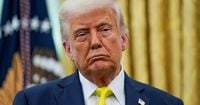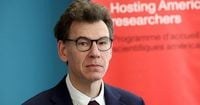On Saturday, April 19, 2025, French Research Minister Philippe Baptiste made a compelling appeal for a collective European initiative to welcome American researchers facing challenges due to the policies of the Trump administration. Speaking on Franceinfo, Baptiste emphasized the importance of a coordinated financial effort at the European level, stating, "It's a collective effort, and I think the right effort must be made at the European level." This call comes ahead of a significant meeting of the European research community scheduled for May 5, 2025, in Paris.
Baptiste highlighted France's proactive stance in this matter, asserting that the country is "very much at the forefront" of welcoming researchers whose work is threatened in the United States. He noted the increasing concerns among American academics regarding their academic freedoms and research funding since Donald Trump's return to the White House in January. The minister did not specify the exact financial implications of this initiative but estimated that bringing a top-level researcher along with their team could cost approximately one million euros over three years.
French President Emmanuel Macron also extended an invitation to researchers from around the globe on Friday, April 18, urging them to "choose France" and Europe. He encouraged them to attend the upcoming meeting on May 5, where the focus will be on the challenges faced by academic freedoms worldwide. Baptiste remarked that the meeting aims to gather the European research and science community to discuss the rollback of academic liberties observed in various regions.
In conjunction with these efforts, the French government launched a new platform called Choose France for Science on April 17, 2025. This initiative is described as a preliminary step to prepare for the arrival of international researchers, signaling France's commitment to being a welcoming destination for global talent.
The backdrop to these developments is the growing unease among researchers and universities in the United States, who are increasingly contemplating leaving the country. This sentiment has intensified due to fears of undermined academic and research freedoms, coupled with significant funding cuts. The academic landscape in the U.S. has been perceived as increasingly hostile, prompting many to seek opportunities abroad, particularly in countries like France, which have traditionally been seen as havens for academic inquiry.
Baptiste's comments reflect a broader concern within the European academic community about the implications of U.S. policies on global research collaboration. The minister's call to action aims to foster a united European response to support researchers affected by these challenges, reinforcing the notion that collaboration and solidarity are essential in the face of adversity.
The upcoming May 5 meeting in Paris is expected to draw significant attention, as it will bring together key stakeholders from the European research sector. Discussions will likely revolve around strategies to enhance research funding, safeguard academic freedoms, and create a more inclusive environment for international researchers.
The initiative aligns with a growing recognition of the need for countries to work together to address the challenges posed by shifting political landscapes. As the global academic community grapples with these issues, France's proactive approach may serve as a model for other nations seeking to attract talent and foster innovation.
As the date approaches, anticipation builds around the potential outcomes of the meeting and the broader implications for international research collaboration. With leaders like Baptiste and Macron advocating for a united European front, there is hope that the academic community will find ways to navigate the complexities of the current geopolitical climate.
In summary, the call for a European effort to welcome American researchers by Minister Philippe Baptiste underscores the urgency of addressing the challenges posed by the Trump administration's policies. With significant financial and logistical support, France aims to position itself as a leader in fostering global research collaboration, ensuring that academic freedoms are upheld and that researchers can continue to contribute to the advancement of knowledge without fear of repression.


